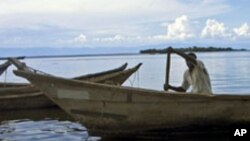This is Part Five of a five-part series on Oil Contracts in Uganda
Continue to Parts: 1 / 2 / 3 / 4 / 5
Ugandans are excitedly awaiting the start of drilling by Tullow Oil of the UK and other multi-nationals. But analysts are concerned about the environmental impact of the move and its effect on local communities.
Tullow Oil has said the deal was “standard” and that company practices would ensure environmental protection. But the pressure group Platform last year said Tullow had framed a deal with no provisions for the potential environmental or social fallout from oil extraction.
Environmentalists are worried that oil fever and inadequate legal protections could jeopardize the area’s rich biodiversity.
”Whatever investment [in the oil industry] is going to be done must be in line with, conform to, and mindful of the sensitivity of the rich ecological diversity of the area,” said Stephen Biraahwa Mukitale, the member of Parliament for Buliisa County, in Buliisa– a district that has the majority of oil wells now under exploration.
He said although there is no substantive law yet on environmental protection, there are relevant provisions in the two oil bills now before parliament. “But we are pushing for proactive way to deal with this issue [environment].
Mukitale said a legal framework should be created that provides the institutions and regulations to deal with oil-related environmental issues. “We cannot depend on the good name of the oil companies. We want an institutional framework, legal framework, and a government regulatory framework that compels them [oil companies] to perform according to some [internationally accepted] standards.”
Mukitale also lamented rampant land grabbing in his area. “This is a remote, rich, rift valley area occupied by peasants, and since oil was discovered land speculation has become a problem. We have been battling individuals who have primitive accumulation tendencies.”
Oil drilling in his area, he said, was initially an apprehensive venture. But the last seven or eight years has led to an improved understanding of oil excavation issues– and to increased interaction between investors, the government and civil society.
Mukitale said he doesn’t believe everybody in his area will be involved in the oil sector. “I believe in co-existence. We are promoting comprehensive land use planning where fishing and farming can continue alongside the new industry.”
He called for the gradual integration of some young peasants with minimum skills and some level of education graduate into oil-related jobs.
In March, Tullow Oil signed production-sharing agreements with Uganda's government before finalizing its new partnership with France's Total and China's CNOOC.
Collaborative agreements with the foreign companies supports the construction of a refinery and an export pipeline from the Lake Albert oil fields.
They’re estimated to contain 2.5 billion barrels of oil, enough crude to supply all of Uganda's domestic needs and for export to neighboring countries.
